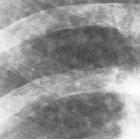Caplan syndrome

Caplan
syndrome • Caplan syndrome - Ganzer Fall bei Radiopaedia
Caplan syndrome, also known as rheumatoid pneumoconiosis, is the combination of seropositive rheumatoid arthritis and a characteristic pattern of fibrosis.
Although first described in coal miners (coal workers' pneumoconiosis), it has subsequently been found in patients with a variety of pneumoconioses .
Epidemiology
Affects 2-6% of patients with pneumoconiosis (in Wales) and is caused by disintegrating macrophages leaving a necrotic core with a surrounding pigmented (black) dust ring and fibroblasts .
Radiographic features
- 5-50 mm well-defined nodules in the upper lung lobes/lung periphery
- nodules may remain unchanged, multiply, calcify, or become thick walled cavities
- background changes of pneumoconiosis
- may have an accompanying pleural effusion
- features often grow in short bursts
History and etymology
It was first described by A Caplan in 1953 .
Siehe auch:
- Pleuraerguss
- Rheumatoide Arthritis
- Silikose
- Pneumonokoniose
- coal workers pneumoconiosis (CWP)
- Zuelzer-Kaplan-Syndrom
und weiter:

 Assoziationen und Differentialdiagnosen zu Caplan-Syndrom:
Assoziationen und Differentialdiagnosen zu Caplan-Syndrom:



